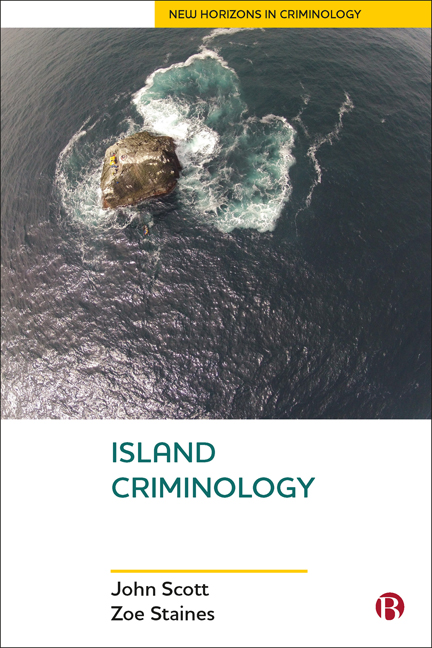Series Editor Preface
Published online by Cambridge University Press: 17 January 2024
Summary
I first became aware of John Scott and Zoe Staines’ work on the place of islands in criminology after reading an article they produced for Theoretical Criminology, published in 2021. This article provided a case study of Pitcairn in the Southern Pacific, one of the world's more remote island communities and a place that in the early 2000s became synonymous with child sexual abuse. Scott and Staines had identified a truly new horizon for criminology, and I wanted to read more as they developed an island criminology. I was delighted when they agreed to produce this important new book that pushes the spatial, temporal, and imaginative boundaries of criminology.
The New Horizons in Criminology book series provides concise authoritative texts that reflect cutting- edge thought and theoretical developments in criminology and are international in scope. They are written so that the non- specialist academic, student, or practitioner can understand them by explaining ideas clearly before going deeper into the subject. For this book Scott and Staines chose not to produce an administrative account of what works in criminal justice in various island settings. Rather, they have fashioned an engaging text that uncovers a ‘politics of place and belonging’. The book takes the reader on a journey to parts of the planet often overlooked by criminology, including the Caribbean, Iceland, Greenland, the Torres Strait Islands and back to the Pacific and Pitcairn where we learn about insularity, the possible negatives of social capital, and the ‘normative nature of crime’. The definition of islands is also pushed, by considering desert, or land- locked ‘islands’ of the Australian interior.
At a time when there are calls to decolonize criminology, some of the islands featured in this book couldn't be further from the metropoles of the Global North. Scott and Staines are interested in definitions of crime and deviance in island settings, in what gets policed – and what does not – and processes of governance, discipline, and Othering. Colonialism and history play their part, but so too do notions of islandness, including the creation of islands as utopian idylls or dystopian horrors, in both fact and fiction. The authors explore techniques of ‘islanding’, with islands used to separate others for health or incarceration, or for the detention of asylum seekers. In this way the authors view islands as places of exclusion. Islands are regarded as literal prisons, but also as feeling like prisons.
- Type
- Chapter
- Information
- Island Criminology , pp. vi - viiPublisher: Bristol University PressPrint publication year: 2023

